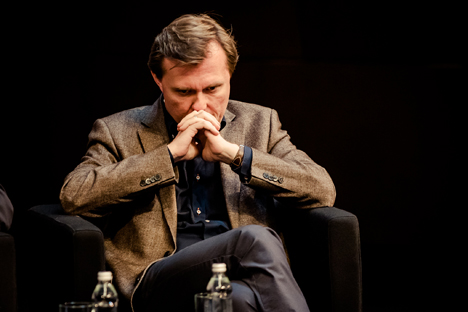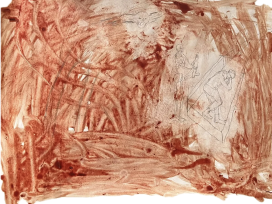
For those who suffered the consequences of Yalta’s division of Europe, the Helsinki Final Act brought grounds for optimism. Today, as Russia’s regressive war on Ukraine reopens old conflicts, it stands as a monument to European modernity.
It is not only events in eastern Ukraine and the Greek crisis that will force the European Union to reinvent itself, argues Andriy Portnov, but also domestic political landscapes in Germany, the United Kingdom and France. The sum of all of these factors will force change.
Ketevan Kantaria: Europe received plenty of epithets at the recent forum “Europe with a view to the future”; one such was Janusz Lewandowski’s comment that Europe is seen as a “continent of mistrust”. How much trust is left in Ukrainian society for Europe and, more specifically, the European Union?

Photo: D. Linkowski. Source: Archiwum ECS.
Andriy Portnov: A sociological study would give a detailed answer to that question. My own intuition tells me that now in Ukraine there’s more understanding for the reality of the EU than during the Maidan. A lot of people are aware of the fact that the EU has no real offer for Ukraine right now. And that is a problem. Then of course there is the question of trust. If Ukraine has no clear perspective of EU membership, the next question should be: what’s next? What is the alternative? There is no alternative. At least I do not see any alternative in Ukrainian debates about the political future of the country.
KK: We already know the outcome of last month’s 4th Eastern Partnership Summit in Riga, so could we say that this too was a big disappointment for Ukrainian society and government; or it was more or less expected?
AP: Personally for me it was not surprising at all. I would say that the summit was an illustration of a lack of any clear EU strategy for Ukraine. Even the visa-free travel agreement is unclear. So I would say the Ukrainian political class should start getting more realistic about the EU.
KK: How helpful would visa liberalization be?
AP: Let me express it from a personal perspective. I am someone who is engaged in a lot of international projects for the last ten years. My own experience with getting Schengen and other visas is full of unpleasant and humiliating episodes. However, I have no delusions. Even a year ago I said that it is unrealistic to expect a positive decision on visa-free travel. What is more, I think right now we are in a situation when the entire Schengen agreement could change because of the immigration issues within the EU.
KK: In that case, would you say that Europe is digging its own grave?
AP: I think we are facing a situation where the EU and NATO as we know them are coming to an end. They need to re-invent and re-imagine themselves. But it is a huge question whether and how they would manage to do that.
KK: German playwright Bertolt Brecht famously warned that “the war is over, beware of the peace!” Has Europe overestimated the post-Cold war “peace” and lost control over its geopolitical presence in the face what is happening now in Ukraine?
AP: First of all there is no peace. Europe, not just Ukraine, is at war, even if not everybody is aware or wants to accept this truth. There are numerous reasons for the outbreak of violence. First, the development in post-communist Europe was partly unexpected, pretty complex and controversial. It appears that the ruling class in Russia is making an attempt to reconfigure the international order. It started with Georgia, let’s not forget about that. Then there was Crimea and Donbas. When it happened it was a shock and a misunderstanding because, I dare say that, up until now, many European politicians have not properly understand the situation. I think we are facing an attempt to change the entire legal and political order, questioning existing borders, international organizations and rules.
KK: This brings us to the question of business relations between the EU and Russia which also plays a role…
AP: This is very much the issue – economic ties. One of the most important presumptions of Vladimir Putin is that because of economic ties the EU will do nothing. It is time for the EU, as well as NATO, to show their strength and motivation. And speaking about the economy, let’s be frank: present-day Russia depends on the export of energy, gas and oil, which mostly goes to the EU. One could also say that Russia is more dependent on the EU, but the perception is vice versa, which in economic terms is false.
Also, let us not forget that in Ukraine and Georgia a large part of population is pro-European – and Europe as a whole has shown little interest in this. Maybe it is reasonable for Georgia and Ukraine to show what the EU could lose by not paying enough attention to the post-Soviet states that really want to be European.
KK: How could they do that?
AP: In my opinion, the only way forward is the reinvention of the EU. It will not be just the changes brought with the war in Ukraine, but also the referendum in the United Kingdom, immigration issues, economic problems in Greece, the eurozone, election results in France and so on. It will be the sum of these factors that will force the EU to change itself.
KK: Do you see a lead country that could guide this re-imagination of the EU?
AP: Objectively that is Germany. That was clear already in early 1990s. There is a very good article by Tony Judt about the future of EU called “Europe: The Grand Illusion”. It was written in 1996, before Poland and other eastern European states joined, and it clearly states that the future of the EU depends on Germany and I agree with that. That is why I see one of the biggest problems as Germany’s indecisiveness and its lack of desire to be a leader of the EU.
KK: In your recent article published by the European Council on Foreign Relations in What does Ukraine think?”, you explain the positioning of Dnipropetrovsk as a city which lost its “special status” after the Soviet breakup and has been trapped in an “ideologically indeterminate and amorphous” state. Nonetheless, the situation has not escalated there as in Donetsk or Luhansk. Why do you think that is?
AP: Thoroughly analysing the situation in Donetsk and Dnipropetrovsk, we will see at least a couple of principle differences that are crucially important. First is the lack of a Russian border and Russian military intervention in the case of Dnipropetrovsk. Second is the behaviour of the local political and business elite. If in the case of Donetsk they were “neutral” and unwilling to stop the pro-separatist movements, in Dnipropetrovsk they were pro-Ukrainian and strongly anti-separatist.
But let’s be honest here. The majority of the population in Dnipropetrovsk as in Donetsk is just ordinary people, Russian-speaking, who want to live normal, peaceful lives. I do not believe in explanations of the outbreak of violence in Donetsk in terms of a “special Donetsk identity” or a “special type of Soviet mentality”. I do not accept this argument at all. Violence was brought there by certain groups of people whom we can actually identify. Lots of them are Russian citizens, sometimes even officers of the GRU (Russian intelligence) and other secret services of the Russian Federation. They brought a violent situation, physical violence and weapons. When the weapons and violence is there, it becomes very hard to stop it from advancing and to bring back a peaceful situation. In other words, Donetsk and Dnipropetrovsk are two very different stories.
KK: Does that mean Dnepropetrovsk is less likely to engage into violence?
AP: We cannot know that. It depends of course, but what we can say now is that due to the local elite and some other factors Dnipropetrovsk escaped the war at least for now.
KK: How do you evaluate the current strategy of the Ukrainian government bringing foreign-born ministers to power such as former Georgian governors who left their positions in Georgia with a controversial background?
AP: In my opinion it is too early to reflect on their effectiveness. Let us wait and see. There are people in Ukraine asking why do we need so many foreign-born ministers, aren’t there Ukrainians who could do the same job? But the argument that appointing people who have no personal ties with the existing corrupted system sounds reasonable to me. The question is whether those concrete people who are appointed on those posts will be capable of dealing with this system and how effectively they can work in a foreign country in the current complex situation. To me it is kind of an experiment.
KK: Is it the proper time for experiments in the situation when the country is at war?
AP: On the one hand, no. The situation is so complex, especially in economic terms – that the only hope for Ukraine is to reinvent itself, to present itself in a completely new way. And to do that you need new people. Not necessarily from abroad but also within the country. To reform you need experiments. The decisions implemented should be tough.
What is a problem for me is that there was very little discussion in Ukraine about those foreign-born ministers’ achievements and downfalls in their previous posts. It would be useful to talk about their previous experience at least. I never heard these foreign-born ministers say anything like: “Okay, so these were my mistakes when I worked as a minister in Georgia or elsewhere, and now I will try to avoid repeating those mistakes here in Ukraine.”
KK: Do you think that the appointment of the former Georgian president, Mikheil Saakashvili, as the governor of Odessa is a provocative gesture towards Russia?
AP: Yes it is. At the moment Russia is at war with Ukraine. The war is not officially proclaimed and recognized, even from the Ukrainian side, but it is a real war. So in this context, Ukraine tries to find symbolic and other ways to differentiate itself from Putin’s Russia. In this respect, Saakashvili perfectly fits the model – deeply hated in Russia, he is very welcomed in Ukraine. The question is whether he is competent, clever and prepared enough to govern Odessa.
Published 25 June 2015
Original in English
First published by New Eastern Europe, online, 15 June 2015
Contributed by New Eastern Europe © Andriy Portnov, Ketevan Kantaria / Eurozine
PDF/PRINTSubscribe to know what’s worth thinking about.

For those who suffered the consequences of Yalta’s division of Europe, the Helsinki Final Act brought grounds for optimism. Today, as Russia’s regressive war on Ukraine reopens old conflicts, it stands as a monument to European modernity.

Artist Marharyta Polovinko’s creativity persisted in a tormented form through her experiences as a soldier on the Ukrainian frontline. The words of a recently called-up fellow creative and young family man provide a stark reminder that the Ukrainian military is buying Europeans time.